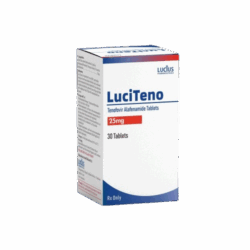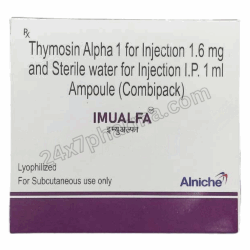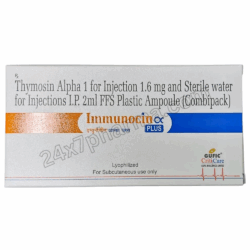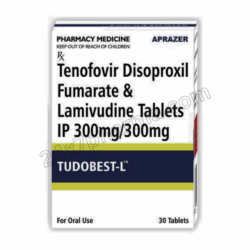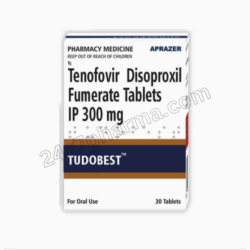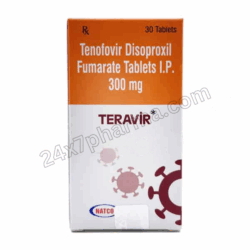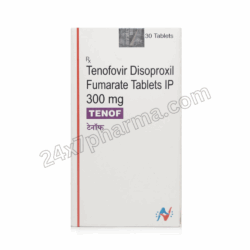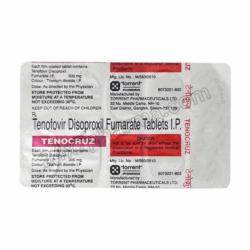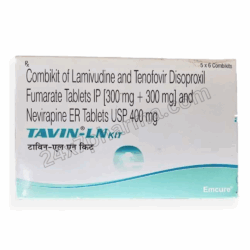Hepatitis B Infection
Showing 1–16 of 30 resultsSorted by latest
IMUALFA 1.6MG INJECTION
Original price was: $50.$46Current price is: $46.IMMUNOCIN ALPHA PLUS 1.6MG INJECTION
Original price was: $60.$55Current price is: $55.VALTEN 300MG TABLET
Original price was: $17.$14Current price is: $14.TUDOBEST L TABLET
Original price was: $22.$19Current price is: $19.TUDOBEST 300MG TABLET
Original price was: $20.$17Current price is: $17.TERAVIR 300MG TABLET
Original price was: $20.$17Current price is: $17.TENVIR AF 25MG TABLET
Original price was: $25.$21Current price is: $21.TENVIR 300MG TABLET
Original price was: $25.$21Current price is: $21.TENTIDE AF 25MG TABLET
Original price was: $28.$23Current price is: $23.TENOHEP AF 25MG TABLET
Original price was: $22.$18Current price is: $18.TENOF 300MG TABLET
Original price was: $25.$21Current price is: $21.TENOCRUZ 300MG TABLET
Original price was: $8.$7Current price is: $7.TAVIN LN KIT TABLET
Original price was: $7.$5Current price is: $5.TAVIN 300MG TABLET
Original price was: $17.$14Current price is: $14.The liver may be severely affected by hepatitis B. The virus is spread by coming into touch with the afflicted person’s blood or bodily fluids. It may also be passed from mother to kid after childbirth. Hepatitis B can cause the liver to suffer significant damage, including cirrhosis (liver scarring), which increases the risk of developing cancer.
Anytime you suspect you may have the virus, it is imperative to have your liver screened for hepatitis B. Although there is no known therapy for hepatitis B, there are ways to manage the infection.
What is Hepatitis B?
A virus called hepatitis B affects the liver and may cause discomfort. By coming into touch with the sick person’s blood or bodily fluids, the virus can spread. It can result from practises like sharing needles, tattoos, or piercings using contaminated equipment or unprotected sexual contact.
At the time of birth, the virus can potentially be transferred from mother to kid. Hepatitis B may result in serious liver damage, which may lead to liver cancer and cirrhosis (liver scarring). Hepatitis B can be treated, but there is no known cure for the disease.
Signs and Symptoms
At first, hepatitis B might not show any symptoms. If symptoms do manifest, they could include exhaustion, nausea, stomach discomfort, black vomit that looks like clay, joint pain, jaundice (yellowing of the skin and eyes), and itching.
After being exposed to the virus, the symptoms often manifest two to six months later. It is imperative to visit your doctor and undergo testing to rule out hepatitis B if you experience any of the symptoms.
Treatment
Hepatitis B has no known treatment. Both the condition and your body’s overall health can be improved with some therapies. Options for treatment include:
- Anti-viral medications: These medications aid in the body’s defense against the infection and stop liver damage from occurring. When used early in an infection, they are most effective.
- Interferon injections: The symptoms of chronic hepatitis B are lessened by interferon, which also aids your body in fighting the infection.
- Surgery: Surgery could occasionally be required to remove a portion of the liver that has been damaged by hepatitis B.
Your doctor will work with you to develop a treatment plan that’s right for you depending on how severe your condition as well as your general health.
Prevention
Getting vaccinated to stave off the illness is the best way to protect yourself from transmitting hepatitis B. Getting the hepatitis B vaccination is secure. Children and adults who have never been exposed to the virus can use it without fear.
Typically, it is administered three times over the course of six months. You’ll always be protected against Hepatitis B once you’ve finished the vaccine schedule! The chance of developing the virus can be reduced by getting the vaccination, engaging in safe and secure sexual activity, and not sharing needles or other injectables.
Living with Hepatitis B
If Hepatitis B has been identified as your disease, Finding a doctor you can trust is crucial if you want to receive treatment as soon as possible. Hepatitis B cannot be cured.
However, there are treatments available that can both treat the illness and improve your family’s overall health. Never give up. By getting vaccinated against the virus and adhering to safe sex injection methods, you can prevent the transmission of the B virus.


